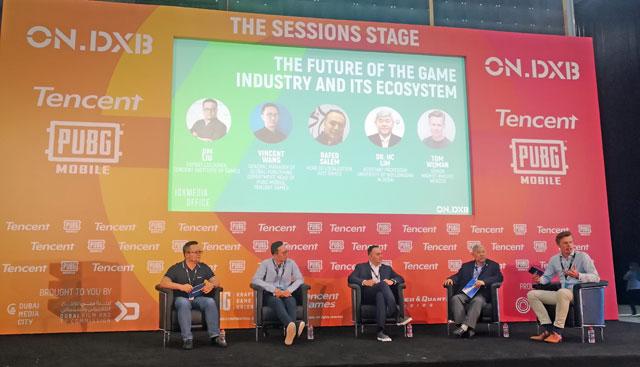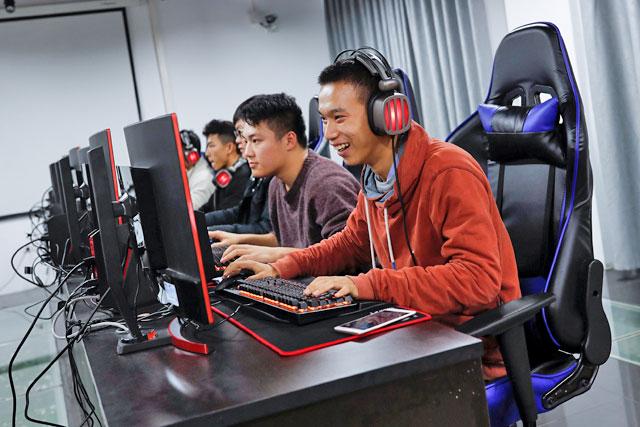You are here
Panel explores future prospects, role of localisation in region’s gaming industry
By Bahaa Al Deen Al Nawas - Nov 23,2019 - Last updated at Nov 23,2019

Gaming industry leaders participate in a panel discussion titled ‘The Future of the Game Industry and Its Ecosystem’, at ON.DXB, a three-day film, game, video and music festival in Dubai on Thursday (Photo by Bahaa Al Deen Al Nawas)
DUBAI — Gaming as a worldwide phenomenon dominated a panel discussion held by leaders in the industry on Thursday at ON.DXB, a three-day film, game, video and music festival featuring live keynotes, panels, showcases, mainstage music, film screenings and workshops.
The panel, entitled “The Future of the Game Industry and Its Ecosystem”, hosted Senior Market Analyst at Newzoo Tom Wijman, Assistant Professor at the University of Wollongong in Dubai HC Lim, Head of Localisation at Riot Games Rafed Salem, General Manager of the Global Publishing Department and Head of PUBG Mobile at Tencent Games Vincent Wang and lecturer at the Tencent Institute of Games Jim Liu.
The discussion kicked off with an exploration of the increase of gaming content, which Wijman said is “not only about gaming itself”, but is connected to the now-43 million e-sports theatres across the world, making gaming a global phenomenon.
“In the past couple of years, gaming has evolved into a real big business, a $100 billion market,” Wang said. He noted that, with the rise of streaming, gaming content has “grown more in the past few years than ever before”, adding that the market “has a lot of potential”.
For his part, Salem said that almost one out of three people in the world is a gamer, stressing that “localisation has been driving this growth in the ecosystem by providing language support not only for the players, where they can play in their own languages – one of the barriers that prevented many players from joining these kinds of games – but also for publishers, to explore new players and audiences in the region”.
Salem also said that mobile gaming has “exploded” in the region, noting that the UAE “has the highest percentage of smart phones in the whole world”, which is why he said publishers show interest in mobile gaming as well.
Speaking from an educational perspective, Lim said that “we are providing the supply side in the equation. We are helping to increase the MENA talent pool and we are making sure that the skills they learn, whether AI, big data or game technology, will be transferable to other industries”.
For his part, Liu discussed the Tencent Institute of Games’ focus on increasing cooperation to seek talent and conduct research continuously to improve the industry.
The panel also addressed the contribution of gaming to economic development in the region, with Rafed noting: “Unfortunately, the MENA region has been missed for many years by different game publishers. But now, with the collaboration of e-sports communities and enthusiast gamers, these things are going to change.”
He once again linked the issue to localisation, as 10 years ago, only a dozen games were localised for Arabic, whereas now, there are hundreds of games available in the language.
Discussion also focused on e-sports events, their contribution to the gaming industry’s growth in the region and their role in guiding game enthusiasts who wish to work in the industry by equipping them with the essential skills for proper growth.
“It is important to provide support to the players,” Salem said, adding that e-sports and the e-sports community were built “not through the work of publishers, but by individuals, who should gather and help players shine and be part of big teams in the future”.
Related Articles
WUHU/SHANGHAI — In an industrial park on the edge of Shanghai, a dozen Chinese teenagers are taking a break from battling digital armies to
DUBAI — Games unite people and bring them together, regardless of their backgrounds, nationalities and global locations, said General Manage
AMMAN — In cooperation with Jordan E-Games (JEG) and the Jordan Olympic Committee (JOC), Zain Jordan on Monday launched the first e-sports a













